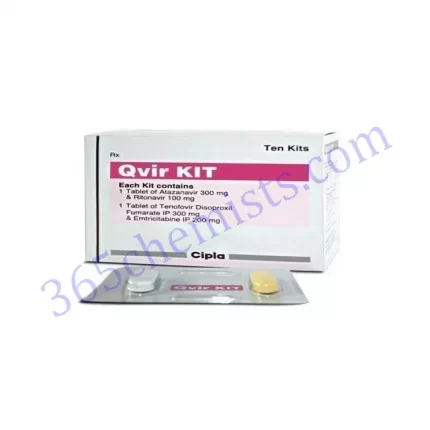Lamivir 150mg Tablet: Empowering HIV Treatment with Lamivudine
A medication called Lamivir 150mg Tablet is one that is utilised in the process of HIV-1 infection treatment. Lamivudine, the medicine’s active component, is a nucleoside reverse transcriptase inhibitor (NRTI), a category of medication that falls under the umbrella term “NRTIs.” Individuals who are living with HIV can significantly benefit from the use of this antiretroviral medication because it helps to suppress viral replication, lower viral load, and improve immune function.
Understanding Lamivudine
Inhibiting the reverse transcriptase enzyme of the human immunodeficiency virus is one of the primary purposes of the powerful antiretroviral medication lamivudine. Lamivudine is an antiviral medication that works by inhibiting an enzyme called reverse transcriptase. This prevents the transformation of viral RNA into DNA, which is a necessary step for viral replication. Lamivudine is able to effectively inhibit the replication of the virus because it interferes with this process. This results in the suppression of the virus and an improvement in immune function.
Indications and Usage
Tablets of Lamivir 150 mg are recommended for the treatment of HIV-1 infection in patients of any age who weigh at least 14 kg. This includes both adult patients and paediatric patients. It is typically prescribed as a component of a combination antiretroviral therapy (ART) regimen, which may also include antiretroviral drugs from other classes, such as non-nucleoside reverse transcriptase inhibitors (NNRTIs) or protease inhibitors. Individuals who are living with HIV should receive treatment in order to achieve and maintain viral suppression, restore immune function, and improve their overall health and quality of life.
Dosage and Administration
It is possible for the recommended dosage of Lamivir 150mg Tablet to change depending on a variety of factors, such as the age, weight, renal function, and treatment history of the patient. It is essential to take the medication at the prescribed intervals and complete the treatment for the full amount of time that was suggested. Oral consumption of the tablet is required, either with or without food. It is strongly advised that the tablet be taken in its entirety, without crushing or chewing it.
Precautions and Warnings
Before beginning treatment with Lamivir 150mg Tablet, it is essential to communicate any preexisting medical conditions, allergies, or medications that are currently being taken to the healthcare professional. Lactic acidosis is a potentially life-threatening condition that is characterised by the buildup of lactic acid in the body. Lamivudine is known to cause this condition. It is extremely important to contact a healthcare provider as soon as possible if you experience any symptoms, including unusual weakness, muscle pain, or difficulty breathing.
Related Product
Lamivir 150mg Tablet
Lamivir Hbv 100mg Tablet
Adverse Effects
Side effects are possible with the use of any antiretroviral medication, including Lamivir 150mg Tablet. Headaches, nausea, diarrhoea, and tiredness are some of the common adverse effects that may occur. These unwanted effects are typically not severe and only last for a short period of time. Furthermore, they typically get better as the body gets used to the medication. On the other hand, there is always the possibility of more serious adverse effects, such as severe skin reactions or toxicity to the liver. It is essential to make a prompt report to the healthcare provider of any symptoms that are out of the ordinary or that persist.
Drug Interactions
There is a possibility of interaction between the active ingredient lamivudine, which is found in Lamivir 150mg Tablet, and other medications, such as over-the-counter drugs, herbal supplements, and prescription medications. It is imperative that the healthcare professional be informed of all medications that are being taken in order to prevent the possibility of adverse drug interactions. Lamivudine may have an effect on the metabolism of other drugs or on the function of the kidneys if it is combined with certain medications. The healthcare provider will evaluate the potential for interactions between the medications and then make any necessary adjustments to the treatment plan.
Conclusion
The antiretroviral therapy that is used to treat HIV-1 infection includes the tablet form of lamivir (150 mg), which is an essential component of that therapy. This medication, which contains Lamivudine as its active ingredient, plays an important part in the suppression of viral replication, the reduction of viral load, and the improvement of immune function. Lamivudine is an anti-HIV medication that works by inhibiting the enzyme responsible for reverse transcriptase, which in turn leads to improved health outcomes and a higher quality of life for people who are infected with the virus. For the most effective management of HIV infection, it is critical to adhere to the recommended treatment plan, take the medication at the dosage that has been prescribed to you, and maintain regular communication with a healthcare professional. In the event that you have any concerns or questions, please do not be reluctant to speak with a healthcare professional for additional direction.












